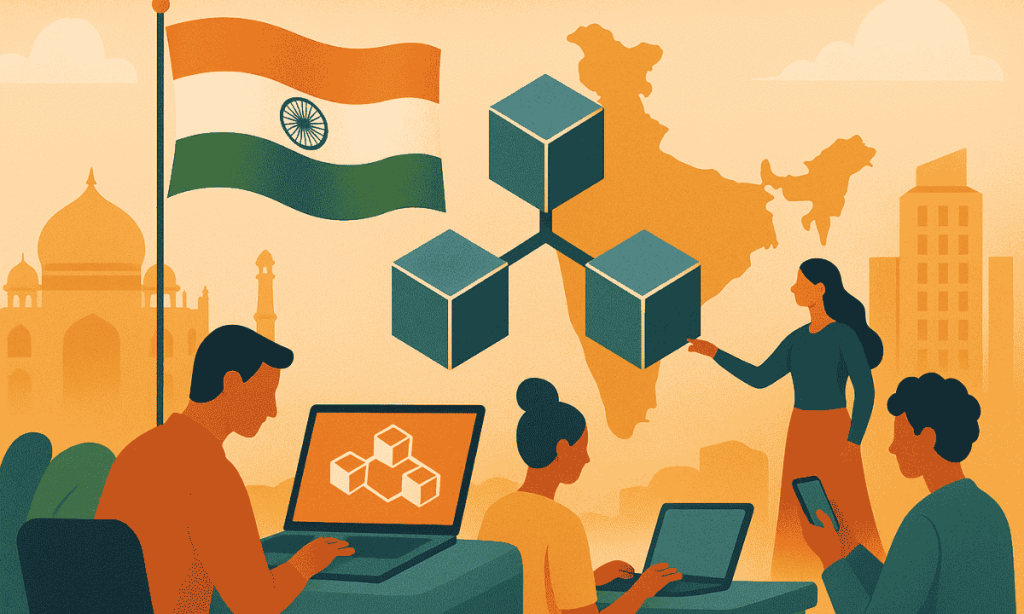It’s just after 9 a.m. in a co-working space tucked between glass-walled towers in Bengaluru’s Whitefield district. The espresso machine hisses, someone’s arguing about gas fees over a crackling Zoom call, and a young developer in a black hoodie is sketching smart contract logic on a whiteboard.
Web3 isn’t just a buzzword here anymore—it’s the next great tech gamble. India, already home to one of the world’s largest developer pools, is mapping a route to the front of the global Web3 race. And unlike the early internet days, this time the country knows it’s competing for the lead from day one.
Why India Sees Web3 as Its Next Big Leap
Search “India Web3 growth,” and you’ll find bold numbers. NASSCOM predicts an 800,000-strong Web3 workforce by 2030. Global VC firms are scouting Mumbai, Hyderabad, and Pune for blockchain startups with export-ready ideas.
Arjun Mehta, an early blockchain investor, leans back in his chair at a Mumbai café and sums it up: “We missed the first wave of social media, but in Web3? We can set the pace.”
India’s edge isn’t just cost-efficient talent. It’s a young, hyper-connected population that’s already comfortable with digital payments, token-based incentives, and online communities. That cultural readiness matters.
Blockchain Adoption in India: Not Just Crypto Trading
For outsiders, “Web3 in India” might sound like crypto day-trading Telegram groups. The reality runs deeper. State governments are piloting blockchain-based land records, universities are experimenting with NFT-verified degrees, and agritech startups are using distributed ledgers to trace produce from farm to supermarket shelf.
On the retail side, Web3 apps are quietly seeping into daily life—fantasy sports with tokenized rewards, decentralized music platforms for indie artists, and even community-owned electric vehicle charging networks.
Crypto Regulation in India: Hurdles and Hope
Of course, the country’s ambitious roadmap has its potholes. The 30% flat tax on crypto gains, coupled with 1% TDS, has pushed some traders—and talent—to friendlier hubs like Dubai and Singapore.
Radhika Sharma, co-founder of a DeFi lending startup, puts it bluntly: “Our coders can work from anywhere. If the rules feel suffocating, they’ll just log in from somewhere else.”
But there’s a flip side. Regulators are building a compliance framework that could, once settled, make India one of the safer and more predictable Web3 markets for institutional capital. For global funds wary of “wild west” crypto jurisdictions, that stability could be a magnet.
Government-Led Blockchain Projects Are Gaining Ground
While policy on cryptocurrencies remains strict, blockchain as a technology has full government attention. The Reserve Bank of India’s digital rupee pilot has moved into live retail testing. Andhra Pradesh is digitizing land registries to curb fraud. Even India’s customs department is testing blockchain to speed up trade paperwork.
These may not grab headlines like token airdrops, but they’re laying critical infrastructure—the kind that makes enterprise adoption possible.
India’s Talent Advantage in the Web3 Era
Ask around any hackathon in Pune or Ahmedabad, and you’ll meet 19-year-olds building DAO tools, supply-chain ledgers, and gaming NFTs on weekends. That’s the quiet strength: a deep bench of developers trained in India’s IT boom, now applying those skills to decentralized architecture.
Global companies have noticed. Polygon (founded in India) has become a Layer-2 heavyweight, and a steady stream of Indian-born engineers now lead blockchain teams in New York, Berlin, and Singapore. The talent pipeline runs both ways.
Competing on the Global Stage
The UAE is sprinting ahead with pro-crypto policies. The EU has MiCA. The U.S. is still wrestling with regulation. India’s challenge—and opportunity—is to balance openness with oversight.
If it gets that balance right, it could be the trusted bridge between the high-risk crypto innovation hubs and the heavily regulated financial capitals. That’s a position few can claim.
The Trust Factor: India’s Real Test
Web3 is as much about trust as it is about code. Can India create an ecosystem where builders, investors, and everyday users feel aligned? That’s the question echoing in conference halls from Bengaluru to Delhi.
There’s no neat answer. But there’s momentum. And in a race where technology evolves faster than legislation, momentum can be the difference between leading and following.








